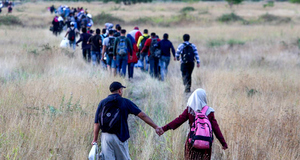Featured Article:Radical Populism in Crisis-Era Greece: Examining the Impact of Populist Movements on Greek Democracy
By
2015, Vol. 7 No. 07 | pg. 3/3 | « Degeneration of the Greek MediaA recent study by Freedom House, tracking press freedom in countries around the world between 2009 and 2013, reported that Greece has undergone the greatest decline out of any country observed. Based on a 100-point scale, Greece as dropped 17 points since 2009, resulting in a reduction of status to ‘partly free,’ almost unheard of in the EU28. Foremost in attributes to this decline in status is the antiquated regulatory environment for broadcasting in Greece. Most licenses for radio and TV stations have expired years or even decades ago, a fact that is largely overlooked by the Greek government. A change in media law in 2007 even allows political party-operated stations to bypass the licensing process altogether. The Freedom House report also cites multiple attacks on journalists covering protests during the crisis, most being carried out by members of Golden Dawn (Freedom House, 2014). This issue was further explored in detail by Reporters Without Borders, who began an investigation of Greece after the government announced the shutdown of three major state broadcasters in June, 2013. The organization found that not only do journalists face an increasing threat of violence when covering anti-austerity demonstrations, but the overall lack of independent news outlets in Greece, coupled with the closure of many state-owned broadcasters, has resulted in an unfortunate loss of pluralism and access to viable information throughout the country (Reporters Without Borders, 2013). As to the content of the endangered media milieu, there has been a consistent emphasis on coverage of social unrest and violence in Greece. Although largely ignored prior to 2009, SYRIZA and Golden Dawn have become the center of media attention, particularly in their collusion with violence. A pivotal moment in this manner of coverage was the live TV broadcast of a debate between representatives of SYRIZA, GD, and KKE, in June of 2012, when Golden Dawn’s Ilias Kasidiaris physically attacked Liana Kaneli from KKE, as the cameras rolled and the host stood aside yelling “no, no, no” (Hatzopoulos, Patelis, 2013). The video went viral on the internet and positively contributed to a rise in support for Golden Dawn, as indicated in opinion polls. In fact, support for the party went from 4% to 6.92% within the ten-day period between the attack and the June elections (Doxiadis, Matsaganis, 2012).The aforementioned degeneracy of Greek media has dramatically shaped peoples preference for news sources. A public opinion report, released by Public Issue in Greece in 2013 found that 73% of people surveyed expressed distrust in TV. Confidence in television was also shown to be in steady decline since 2007. A separate Public Issue survey found that while sourcing news from television and print is falling out of favor in Greece, people are instead turning to the internet and social media networks for information (Public Issue, 2013). Here is where the divisive and conspiratorial rhetoric is most poignant. The research group, Counterpoint, released an article in 2012, highlighting online conspiracy theory in Greece. By studying the most viewed YouTube videos in the country at the time of publishing, the authors made startling discoveries into the prevalence of anti-capitalist narratives, saturating the website. According to the study, the most watched video was The Video That All Greeks Must See, which blames the debt crisis on conniving foreign investors looking to take over the Greek State. Wake Up!!! Here Are the Traitors Shock Video, was the second most watched. This deals with the alleged involvement of major Greek political leaders in Freemasonry. Finally, the third most popular video was The Best Ever Technical Economic Analysis of Greece, which discusses Turkish and German conspiracies in the Greek loan agreement, suggesting the country should look for a better deal from Russia (Doxiadis, Matsaganis, 2012). The purpose of including these findings is not to undermine the rationale of political and social opposition movements in Greece, but rather to present the possible intervening factor of misinformation, which may ultimately weaken the arguments and moral positioning of popular demands. If populism is to have any corrective effect on the crisis in Greece, the potential for which will be explored in the concluding section of this paper, the alterity of its position must be fortified with valid information. An honest conceptualization of ‘otherness’ must also acknowledge complicity, which will be discussed next. The Ill-Defined Lines of AlterityThe breadth of tax evasion and unrecorded economic activity in Greece has been well documented. A country report, filed by the International Monetary Fund, provides some surprising insight into the reasons for the country’s low tax morale. For one, the cost vs. benefits ratio is extremely imbalanced. Taxes in Greece are high, while detection of evasion and the enforcement of penalties is low. The percentage of self-employed workers in Greece is roughly double the EU average, making it more difficult to trace income. Dissatisfaction of provided services along with a general perception that the tax system is unfair, are also cited as reasons for the unwillingness of to pay taxes (IMF, 2013). Other explanations have been put forth linking poverty to the development of a large informal economy in Greece, and thus to the prevalence of unrecorded and un-taxed economic activity (Danpoulos, Znidaric, 2007). Elsewhere, it has been argued that the majority of tax evasion and corruption in Greece has taken part within a social class of professionals and financial elites. (Georgakas, 2014). Evidence pointing to exactly who participated in tax evasion, along with other corrupt activities commonly attributed to the Greek financial crisis, remains unconsolidated and dubious. A survey on corruption in Greece, taken by Transparency International, shows that 82% of respondents either agreed or strongly agreed with the idea that ordinary people can stop corruption (Transparency International, 2013). Thinking in terms of political action, what is discernable from recent elections is that Greek voters are well aware of the level of corruption in their country, as well as its impact on national conditions, and are poised to effectuate change. Recent Elections and the Trajectory of Public OpinionResults from the 2014 municipal, regional, and European Parliament elections in Greece show a continued decline in support for mainstream parties. SYRIZA became the majority party representing the country in the European Parliament with 26.57% of the vote, as opposed to 4.70% in 2009. New Democracy’s support dropped from 32.30% in 2009 to 22.72%. PASOK, reformed into the Olive Tree party for the 2014 elections, received only 8.02% as opposed to 36.65% in 2009. Golden Dawn’s first run at the European Parliament received an impressive 9.39% of the vote (Ministry of Interior, n.d.). The unfavorable results for mainstream parties and subsequent rise in support for oppositional parties is not surprising considering recent public opinion polls in Greece. The Pew Research Global Attitudes Project illuminates growing dissatisfaction with national and economic conditions. Of the 44 countries polled, Greece showed the greatest percentage of people dissatisfied with national conditions (95%), the current economic situation (97%), and negative opinions on the future of the economy (53%). These figures have remained relatively stable throughout the crisis (Pew Research, n.d.). The overwhelming pessimism expressed in public opinion polls such as this, indicates that protest voting may be a significant factor in the dramatic changes in the electoral success of extremist, populist party’s in Greece. At the same time, it’s important to consider that support for both SYRIZA and Golden Dawn has been continuous and growing in strength since the implementation of austerity (Roushas, 2014). Several recent polls taken post-2014 elections show gains in support for SYRIZA, now the most favored political party in the country (Public Issue 3., 2014, Phantis, 2014). ConclusionThe recent inconstancy of the party system in Greece is indicative of more comprehensive changes to come. The overwhelming demand for deliberative, participatory, and direct forms of democracy has been conveyed in city squares across Greece and now in the halls of the Hellenic parliament. This should be interpreted as a sign of political courage and fortitude, transpiring through the actions of corporeal political subjects, united through popular demand. Here, populism is serving a transitional purpose- one that is working to correct the hypocrisy of a failing democratic order. While democracy has been consolidated, at least electorally since 1974, political officials have indulged in corrupt statist dispositions throughout the forty-year period. The underlying venality in the management of Greece’s economy and welfare state has led to an eruption of political and social volatility, this being followed by the usurpation of the Greek constitution under the conditions of the bailout. The integrity of democracy has been compromised to the extent that political radicalism has found mass appeal. But here, distinctions need to be made. Radical-left and right-wing populism in Greece is not simply two sides to the same equation. The former promotes inclusionary democracy, while the latter promotes exclusionary democracy. The left argues for more opportunity in political participation, especially for marginalized groups, while the right calls for greater degrees of marginalization and a concentration of political participation. Both sides express nationalist sentiments through their opposition to the post-democratic complexion of Europeanization, arguing that the deferential position of the Greek nation-state under the predominance of supranational institutions is undermining popular sovereignty. The ‘Troika’ as argued, consists of three non-democratically elected, supranational institutions assuming power over Greece, which eclipses that of both the country’s national parliament and its constitution. Considering the extent of constitutional negation underscoring the conditions of the memorandum, there’s no reason why political repercussion, even from radical populist parties, should be dismissed as being an inherent threat to democracy. People in Greece, as political subjects, have already been denied democratic agency through the implicit coercion of the modernization process. Combined with the loss of sovereignty to supranational institutions, the position of the citizen has been further depoliticized. On a positive note, the current popular movement in Greece is revitalizing civic engagement through the crisis. In opposition to impersonal, elitist leadership, it’s helping create a voice from within the democratic deficit, demanding the return to a moral codification of society based on the direct participation of ‘the people,’ one that promises to address a wide spectrum of unmet demands. At the political level, Golden Dawn has co-opted much of the popular indignation in Greece, particularly that of young, male Greek-nationals. Acting on their own accord, they have utilized authoritarian violence to effectuate a social and political agenda, completely undermining their claim to be rescuing democracy from the clutches of neo-liberal oligarchs. At the point of writing, Golden Dawn’s status has been reduced from that of an active political party to a criminal hate-group. Two female judges under 24-hour police protection are heading an investigation into the criminal activities of the group, which includes several murder charges. The party will most likely be barred from any further political positions (TheGuardian, 2014). 5 Likewise, SYRIZA has yet to officially condemn the implicit use of violence in anti-memorandum protests, which caused significant property damage, injuries, and even a loss of lives. The party’s support for extra-legal behavior in the crisis is incompatible with their broader message of re-democratization. Their radical and illiberal critique of capitalism, however, should not be confused with the anti-state rhetoric and violence of anarchist groups in Greece. In fact, SYRIZA’s active role in helping articulate the demands and needs of the indignant ‘mass’ during the crisis has inevitably relaxed the potential for a true violent uprising. Furthermore, their practical involvement in both the development and funding of social protection networks speaks to their commitment to a new social and political morality in Greece. Overall, what has been demonstrated through the endurance, passion, and efficacy of social indignation and solidarity building during the crisis is that by any means necessary, the people will be heard. ReferencesDanopoulos, Constantine P. and Boris Znidaric. (2007) "Informal Economy, Tax Evasion, And Poverty In A Democratic Setting: Greece." Mediterranean Quarterly 18.2: 67-84. Diakoumakos, George. (2012) “Post-materialist values and crisis. Explaining the Greek Political Crisis According to Inglehart’s Theoretical Framework.” European Sociological Association Social Theory Conference: Crisis and Critique. Athens. September 6-8. Douzinas, Costas. (2013) Philosophy and Resistance in the Crisis: Greece and the Future of Europe. Polity Press. Cambridge, UK. Doxiadis, Aristos and Matsaganis, Manos. (2012) “National Populism and Xenophobia in Greece.” Counterpoint. UK. Euroborometer. “Public Opinion. Archives” 1974-2014. European Commission. Eurostat (a.) “File: Unemployment rate” 2003-2013. European Commission. Eurostat (b.) “Severe Material Deprivation Rate by Broad Group of Citizenship (Population aged 18 and Over).” European Commission. Freedom house. “Greece: Freedom of the Press.” 2013. Gemisis, Kostas, and Triga, Vasiliki. (2013) “Party Positions for the May and June 2012 parliamentary elections in Greece.” Data Archiving and Networked Services. Halikiopoulou, D., Nanou, K., and Vasilopoulou, S. (2012) “The Paradox of Nationalism: The Common Denominator of Radical Right and Radical Left Euroscepticism.” European Journal of Political Research 51: 504-539. Hatzopoulos, Pavlos and Patelis, Korinna. (2013) “The Comrade is Violent: Liberal Discourses of Violence in Anti Austerity Greece.” Theory and Event 16(1). IMF Country Report No. 13/155. Greece: Selected Issues. June 2013 Katerini, Tonia. “Organizing to Survive in Greece.” RedPepper. December 2012. Laclau, Ernesto (2007). On Populist Reason. Verso. New York, New York. Links: International Journal of Socialist Renewal. “Greece: Syriza’s 40-point Program.” Mastiganis, Manos. (2013) “The Greek Crisis: Social Impact and policy Responses.” Friedrich-Elbert-Stiftung. Ministry of Interior. Hellenic Republic: Elections Mudde, Cas. (2007) Populist radical right parties in Europe. Cambridge University Press. Cambridge, UK. Mudde, Cas and Rovira Kaltwasser, Cristóbal (2012) Populism in Europe and the Americas: Threat or Corrective for Democracy? Cambridge University Press. New York, New York. National Report. “Study on Volunteering in the European UnionCountry Report Greece.” European Commission. Nevradakis, Michael. “Are Greece's Loan Agreements and Austerity Measures Illegal? Greek Constitutional Law Scholar Says 'Yes'.” Huffington Post. 31 October 2012: Accessed Online. OECD. “Better Life Index: How’s Life in Greece?” May 2014. Pantazidou, Maro. (2012) “Civil Society at Crossroads.” Humanist Institute For Co-operation with Developing Countries. Rotterdam, The Netherlands. Pautz, Hartwig and Kominou, Margarita. (2013) “Reacting to ‘Austerity Politics’: The Tactic of Collective Expropriation in Greece.” Social Movement Studies. 12(1): 103-110. Pew Research: Global Attitudes Project. “Topics: Opinions on National Conditions, Current Economic Situation, Future of the Economy.” Phantis. “SYRIZA leads 3.9 pct over ND, says opinion poll.” 20 October 2014. “Profile: Greece’s far-right Golden Dawn Party” BBC News Europe. 1 October 2013: Accessed Online. Psimitis, Michalis. (2011) "The Protest Cycle Of Spring 2010 In Greece." Social Movement Studies 10.2: 191-197. Public Issue a. “The 4 ‘tribes’ of Information.” 2013. Public Issue b. “Greek Public Opinion on the Issue of Golden Dawn and the Role of Television.” October 2013. Public Issue c. “Vote Estimate.” October 2014. Reporters Without Borders a. “RWB Secretary-general Flies to Athens After State TV Stations Closed.” 12 June 2013. Reporters Without Borders b. “Golden Dawn Close to Being Added to ‘Predators’ list.” 4 June 2013. Roushas, Roxani. (2013)“Understanding the Electoral Breakthrough of Golden Dawn in Greece: A Demand and Supply Perspective.” International Migration Institute. Working Papers 83. Rüdig, Wolfgang and Karyotis, Georgios. (2013) “Beyond the Usual Suspects? New Participants in Anti-Austerity Protests in Greece.” Mobilization: An International Quarterly 18(3): 313-330. Sakellaropoulos, Spyros. (2012) "On The Causes And Significance Of The December 2008 Social Explosion In Greece." Science & Society 76.3: 340-364. Simons, Stefan. “Tough Words: Merkel and Sarkozy Halt Payments to Athens. Speigel Online. 3 November 2011: Accessed Online. Smith, Helena. “Golden Dawn: Courage of Two Women Stems the Rise of Greece’s Neo-Nazis.” The Gaurdian 22 March 2014: Accessed Online. Sotiropoulos, Dimitri A. and Bourikos, Dimitris. (2014) “Economic Crisis, Social Solidarity and the Voluntary Sector in Greece.” Journal of Power, Politics and Governance 2.2: 33-53. Stamouli, Nektaria. "Greek Court Orders Detention of Far Right Golden Dawn Politician." Wall Street Journal. 10 July 2014: Accessed Online. Theodossopoulos, Dimitrios. (2014) "The Ambivalence Of Anti-Austerity Indignation In Greece: Resistance, Hegemony And Complicity." History & Anthropology 25.4: 488-506. Theodossopoulos, Dimitrios. (2013) "Supporting A Party That You Don't Entirely Support." Suomen Antropologi: Journal Of The Finnish Anthropological Society 38.1: 109-111. Transparency International. “Global Corruption Barometer.” Greece. 2013. Wainwright, Hilary. “Greece: SYRIZA shines a light.” Open Democracy. 29 August 2012. World Bank. Greece. “GDP Per Capita, General Government Final Consumption Expenditure.” Xaameriki: Golden Dawn News in English. “The Manifesto of Golden Dawn.” Endnotes1.) “The powerful imagery of the powerful indignant citizen- victim of ‘the mistakes of others,’ ‘those bankers, politicians, unscrupulous capitalists,’ validates a moral standpoint for eliciting a critique of the consequences of austerity in everyday life” (Theodossopoulos, 2014). 2.) Giogos Kasimatis helped draft Greece’s 1975 constitution along with its amendments in 1986. 3.) Golden Dawn is a Greek ultranationalist political party formed in 1985 by Nikos Mihaloliakos. Until the 2012 national elections, the party had never occupied any seats in parliament. 4.) SYRIZA, an acronym for the Coalition of the Radical Left, is a political party founded in 2004 and led by Alexis Tsipras. They have had marginal electoral success in Greece until the 2012 national elections, in which they became the main opposition party in the Hellenic Parliament. 5.) The Guardian article points out the ironic fact that the investigation of the Golden Dawn, considered to be a macho and militaristic party, is being carried out by two people belonging to the first generation of female judges in Greece. Suggested Reading from Inquiries Journal
Inquiries Journal provides undergraduate and graduate students around the world a platform for the wide dissemination of academic work over a range of core disciplines. Representing the work of students from hundreds of institutions around the globe, Inquiries Journal's large database of academic articles is completely free. Learn more | Blog | Submit Latest in Political Science |


















